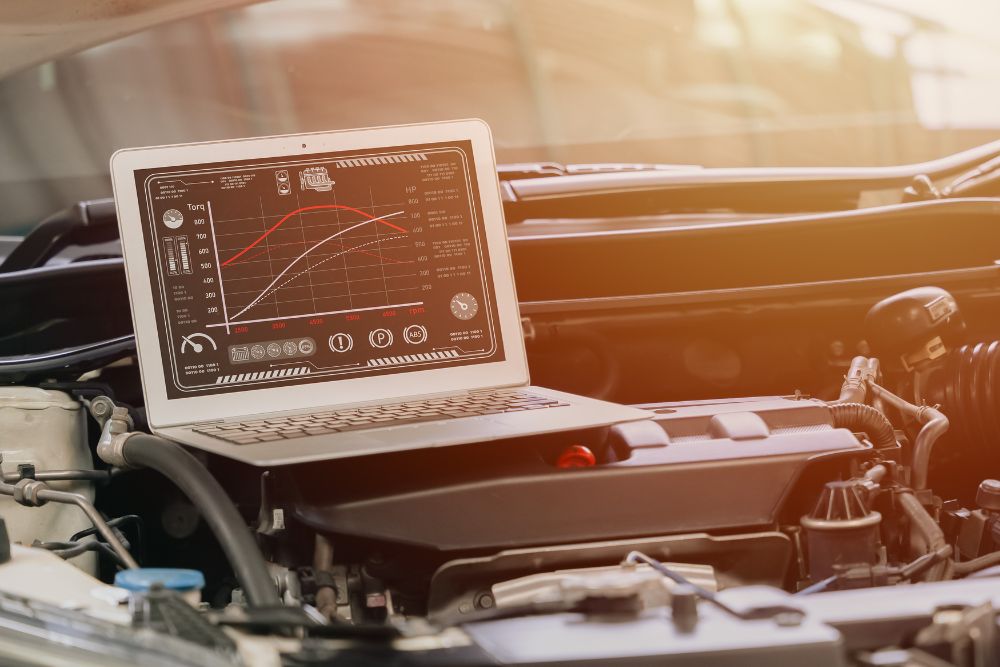
When considering performance upgrades for your vehicle, ECU tuning often comes up as one of the most cost-effective options. Many drivers in Auckland wonder exactly how much additional power they can realistically expect from an ECU tune. While manufacturers make various claims, the actual results depend on several factors specific to your vehicle. This article will discuss the realistic power gains you can expect from professional ECU tuning and what affects these outcomes.
Realistic Power Gains From ECU Tuning
ECU tuning, also known as engine remapping or chip tuning, involves modifying your vehicle’s engine control unit parameters to optimise performance. For naturally aspirated petrol engines, you can typically expect power increases of 5-15% from a quality ECU tune. This translates to approximately 10-30 horsepower depending on your base engine. For example, a standard 200 horsepower engine might see gains of 10-30 additional horsepower after professional tuning.
Turbocharged and supercharged engines generally respond much better to ECU tuning, with potential power increases ranging from 15-30% over stock figures. These forced induction engines have more parameters that can be adjusted and optimised, allowing for greater power extraction without hardware changes. A turbocharged vehicle with 250 horsepower could potentially gain 40-75 horsepower from a well-executed tune.
Diesel engines, particularly those found in European luxury SUVs and sedans, often show the most dramatic percentage improvements from ECU tuning. Modern diesel vehicles like the BMW X5/X6, Mercedes-Benz GLE, and Audi Q7 can see power gains of 20-35% and even more impressive torque increases of up to 40%. This makes ECU tuning particularly popular among European diesel vehicle owners in Auckland who want improved performance along with the efficiency benefits of diesel power.
Factors That Influence Tuning Results
The age and condition of your vehicle significantly impact potential power gains.
Newer vehicles with modern engine management systems typically have more conservative factory settings with greater potential for optimisation. Meanwhile, older vehicles might have less sophisticated ECUs with fewer adjustable parameters, potentially limiting tuning benefits.
Your vehicle’s existing modifications also play a crucial role in determining power increases. A completely stock vehicle will see modest but noticeable improvements, while cars with supporting modifications like upgraded intake systems, exhaust components, or intercoolers can achieve substantially higher power gains. These supporting modifications remove restrictions that would otherwise become bottlenecks when the ECU is tuned more aggressively.
The quality of fuel available in Auckland and your typical driving conditions also influence tuning outcomes. Higher-octane fuels allow for more aggressive timing adjustments, resulting in greater power. Some performance tunes are specifically designed for premium fuels and won’t deliver optimal results with regular petrol. Your local driving environment matters too – a tune optimised for Auckland’s climate and elevation will perform better than generic programming.
Standard Tune vs. Custom Tune Differences
Off-the-shelf or standard tunes typically deliver power increases at the lower end of the spectrum, usually around 5-10% for naturally aspirated engines and 10-20% for turbocharged applications. These pre-programmed maps are designed to work safely across a wide range of vehicles and conditions, so they tend to be more conservative.
Custom or dyno tunes, where your specific vehicle is adjusted while running on a dynamometer, can achieve the upper limits of possible power gains – often 10-15% for naturally aspirated engines and 20-30% for turbocharged vehicles. This personalised approach accounts for your exact vehicle specification, any modifications, and local conditions to extract maximum performance safely.
Multi-stage or adjustable tunes offer different power levels that can be selected based on fuel quality, driving conditions, or preference. These versatile tunes might include economy, daily driving, and performance settings, with the most aggressive settings delivering the highest power increases but requiring higher-quality fuel and potentially affecting long-term reliability if used constantly.
Torque Improvements and Drivability Changes
While horsepower gains get most of the attention, torque improvements often make a more noticeable difference in everyday driving. ECU tunes frequently deliver torque gains throughout the rev range, with increases of 10-25% for petrol engines and 25-40% for diesel engines. This translates to improved acceleration, particularly in the mid-range RPMs most commonly used during daily driving.
The torque curve reshaping that occurs during tuning can dramatically improve drivability. Factory tunes often have artificial dips or flat spots in the torque curve to meet various regulatory requirements or reliability targets. A good ECU tune smooths these out, creating more linear power delivery and eliminating hesitation during acceleration.
Throttle response improvements represent another significant benefit that doesn’t show up in peak power figures. Many modern vehicles have deliberately dulled throttle response from the factory for emissions and fuel economy purposes. Tuning can restore a more direct connection between your foot and the engine, making the vehicle feel considerably more responsive even if the peak power gains are modest.
Fuel Economy Considerations
Contrary to popular belief, ECU tuning doesn’t always worsen fuel consumption. Economy-focused tunes can actually improve fuel efficiency by 5-10% by optimising fuel delivery and timing across the rev range. These tunes are particularly popular among Auckland commuters looking to reduce their fuel bills while still enjoying improved drivability.
Performance-oriented tunes typically maintain similar fuel economy to stock settings during normal driving but will use more fuel when the additional power is utilised. The increased efficiency from optimised parameters often offsets the extra fuel used when accessing the additional power. Many Auckland drivers report negligible changes in overall fuel consumption after tuning when maintaining similar driving habits.
Dual-purpose tunes offer the best of both worlds by providing multiple maps that can be switched between, depending on your priorities at the time. For example, an economy mode for daily commuting around Auckland and a performance mode for weekend drives through the Waitakere Ranges gives you flexibility without compromise.
Reliability and Longevity Implications
Conservative ECU tuning that achieves power gains in the 5-15% range typically has minimal impact on engine reliability. These modest adjustments stay well within the mechanical safety margins built into modern engines. Many Auckland vehicles operate with these tunes for years without issues.
More aggressive tunes seeking maximum power (20%+ increases) may impact long-term reliability, particularly if supporting modifications aren’t installed. Components like clutches, transmissions, and engine internals experience greater stress with substantial power increases. For these higher-output tunes, supporting modifications become essential rather than optional.
The quality of the tuning provider significantly impacts reliability outcomes. Experienced tuners with brand-specific knowledge understand the safe limits of each engine platform and can create tunes that balance performance and reliability.
Real-World Examples from European Performance Cars in Auckland
The popular Volkswagen Golf GTI responds exceptionally well to tuning in the Auckland market. Stock models with approximately 180kW can gain 40-55kW from quality ECU tuning alone, representing a 22-30% increase. These turbocharged engines have significant headroom built in from the factory.
BMW’s turbocharged models, particularly the 135i/235i and 335i/435i with the N54/N55 engines, are highly responsive to ECU tuning in Auckland. These vehicles commonly see power increases of 25-35%, with stock outputs of around 225kW jumping to 280-305kW with just software modifications. The B58 engine found in newer models offers similar potential.
Mercedes-AMG vehicles, despite being highly tuned from the factory, still respond impressively to ECU modifications. The A45 AMG, for instance, can gain 30-45kW from its already potent 280kW factory output, while maintaining reliability. The larger V8 engines in C63 and E63 models typically see 10-15% gains, adding substantial power to already impressive platforms.
Audi’s S and RS models, particularly those with the EA888 2.0-litre turbo engine or the 2.5-litre five-cylinder, demonstrate excellent tuning potential in Auckland’s driving conditions. The RS3 can gain 50-70kW from its factory 294kW rating with proper ECU optimisation, making these already quick vehicles truly exceptional performers.
Getting an ECU Tune in Auckland
Before tuning, a comprehensive vehicle assessment is essential to identify any existing issues that could be exacerbated by increased power. Worn components, existing leaks, or deferred maintenance items should be addressed before tuning to ensure reliable results.
The tuning process typically takes 2-4 hours for a quality custom tune, including baseline testing, multiple tuning runs, and validation testing. Off-the-shelf tunes can be installed much more quickly, often in under an hour, but don’t offer the same level of optimisation for your specific vehicle and Auckland’s conditions.
Post-tuning, a period of adjustment is normal as you become accustomed to the vehicle’s new performance characteristics.
Warranty and Legal Considerations
Most manufacturer warranties will be affected by ECU tuning, though the specific impact varies by manufacturer. Some brands can detect tuning even after reverting to stock settings, while others focus more on proving that modifications caused a specific failure. We can provide guidance on warranty implications for your specific vehicle.
Insurance companies in New Zealand have varying policies regarding vehicle modifications including ECU tunes. It’s essential to disclose these changes to your insurer to ensure your coverage remains valid. Some insurers charge additional premiums for modified vehicles, while others may refuse coverage for heavily modified cars.
Need Expert ECU Tuning in Auckland?
As Auckland’s performance specialists, we at Dodson can help you achieve the optimal balance of power, drivability, and reliability through professional ECU tuning services. Our experienced technicians understand the unique requirements of vehicles in the Auckland region and can create custom tunes that deliver impressive results while maintaining dependability. Contact our team today by calling 09 441 3635 to discuss how ECU tuning can transform your driving experience.

 Looking for Dual Clutch transmission components outside of New Zealand?
Looking for Dual Clutch transmission components outside of New Zealand?